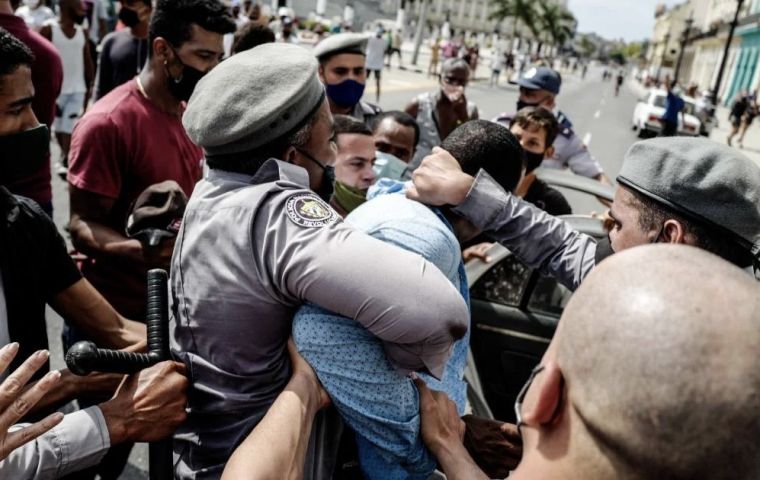MercoPress. South Atlantic News Agency
HRW warns of “oppressive regimes” and “weaknesses” in Latin American democracy
 The HRW document made no mention of Uruguay
The HRW document made no mention of Uruguay The Non-Government-Organization (NGO) Human Rights Watch (HRW) was particularly attentive to Latin America in its latest report, released this week.
The document focused on the situation in Argentina, Brazil, Chile, and on Caribbean countries that need to “address chronic human rights problems such as poverty, inequality, corruption, insecurity and environmental degradation while at the same time protecting democracy.”
“The lack of effective responses to corruption, violence, and poverty has been used as a pretext by politicians who promise solutions that sound simple but are often abusive,” HRW's acting Americas director Tamara Taraciuk Broner said.
“Leaders in the region should demonstrate that democracy can respond to the needs of the population by promoting the rights to health, education, and security and strengthening the rule of law,” she added.
The report also points out that almost a third of the population lives in poverty, and more than a tenth in extreme poverty, while over 50% of the region's total income ends up in the hands of the wealthiest 20%.
With racism far from being eradicated, poverty and inequality continue to disproportionately affect women, children, and indigenous people. HRW also highlighted that deforestation was one of the region's greatest challenges because it continued to destroy forests and affect biodiversity and the livelihoods of thousands of people.
According to HRW, Cuba, Nicaragua, and Venezuela are “oppressive regimes” that “commit aberrant abuses against critics to silence dissent” while “democratically elected leaders in Latin America can play an essential role in pressing for a democratic transition, for example, by urging the government of Nicolás Maduro in Venezuela to negotiate acceptable electoral conditions; the government of Daniel Ortega in Nicaragua to release more than 200 political prisoners; and the government of Cuba to drop criminal charges against arbitrarily detained individuals.”
HRW also noted that Latin America has “the highest annual homicide rate in the world, at 21 homicides per 100,000 inhabitants.” In El Salvador, “the heavy-handed security measures imposed by the government of President Nayib Bukele and the accelerated dismantling of democratic institutions have led to widespread human rights violations by the security forces [while in Mexico] violent crime has reached historic highs.” The study also criticized the deepening of “failed militarization strategies.”
Haiti's judiciary “is practically collapsed,” HRW also stressed. That situation overlaps with an outbreak of cholera while the streets are ruled by gangs, which also have devastating effects on Ecuadorian prisons. In such a scenario, HRW called for the strengthening of “the pillars of democracy” ahead of the various elections scheduled for 2023.
HRW also dedicated a few paragraphs to Peru, after the impeachment of President Pedro Castillo Terrones, while in Guatemala President Alejandro Giammattei and the Public Ministry “have obstructed judicial processes for corruption and other serious crimes, and have promoted spurious criminal proceedings against judges, prosecutors, and independent journalists.”
In Honduras, leftwing President Xiomara Castro also “suspended some fundamental rights in certain areas of the country with the alleged aim of combating criminality, creating the conditions for possible abuses,” HRW also underlined.
Regarding Argentina, HRW mentioned a “hostile rhetoric towards judges by authorities, delays in the appointment of judges and other high-level authorities, and corruption, also present in the Judiciary, [which] have progressively undermined the rule of law.”
“In Bolivia, one government after another has made use of a judiciary system vulnerable to external interference to promote politically motivated criminal proceedings against opponents,” HRW's report also mentions.
And in Brazil, the NGO pointed to President Luiz Inácio Lula Da Silva's need to “reverse the setbacks in human rights caused by former President Jair Bolsonaro and restore confidence in the democratic system.”
HRW also foresees a challenging year for Colombian President Gustavo Petro “in a climate of growing violence caused by armed groups, police abuses, and high poverty rates.”
In Chile, President Gabriel Boric Font “should move forward with a police reform, the protection of migrants and refugees, and improve access to abortion,” the organization insisted.




Top Comments
Disclaimer & comment rulesCommenting for this story is now closed.
If you have a Facebook account, become a fan and comment on our Facebook Page!